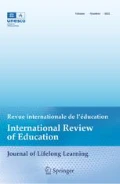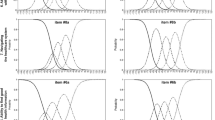Abstract
The paper evaluates the work of the International Adult Literacy Survey as reported in OECD 1997. It assesses its contribution to understanding literacy in terms of the perspective of the New Literacy Studies. It outlines this perspective as a basis for a critique that is mostly concerned with the validity of the test. Three criticisms of the survey are made: that it provides only a partial picture of literacy; that culture is treated as bias; and that the test items do not represent the real-life items as claimed. Finally, the paper concludes with an overall evaluation of what the IALS achieves in terms of its own aims.
Similar content being viewed by others
References
Barton, D. 1994. Literacy: An Introduction to the Ecology of Written Language. Oxford: Blackwell.
Barton, D. and Hamilton, M. 1990. Literacy Research in Industrialised Countries: Trends and Prospects. UIE Reports 2.
–––. 1998. Local Literacies: Reading and Writing in One Community. London: Routledge.
Barton, D. and Ivanic, R., eds. 1991. Writing in the Community. London: Sage.
Binkley, M. and Pignal, J. 1998. An analysis of items with different parameters across countries. In: Murray, S. Kirsch, I. and Jenkins, L., eds., Adult Literacy in OECD Countries: Technical Report on the First International Adult Literacy Survey. Washington: US Dept of Education, National Center for Education Statistics (NCES 98-053). 143–160.
Bynner, J. and Parsons, S. 1997. It Doesn't Get Any Better: The Impact of Poor Basic Skills on the Lives of 37-year-olds. London: The Basic Skills Agency.
CONFINTEA, Adult Education: The Hamburg Declaration: The Agenda for the Future. Fifth International Conference on Adult Education 14-18 July 1997. UNESCO.
Davis Smith, J. 1998. The 1997 National Survey of Volunteering. National Centre for Volunteering/ University of East London.
Elsdon, K. 1995. Voluntary Organisations: Citizenship, Learning and Change. Leicester: NIACE.
Goldstein, H. 1998. Models for Reality: New Approaches to the Understanding of Educational Processes. Professorial Lecture, University of London, Institute of Education.
Gee, J. 1990. Social Linguistics and Literacies: Ideology in Discourses. London: Falmer Press, Second edition.
Gee, J., Hull, G. and Lankshear, C. 1996. The New Work Order: Behind the Language of the New Capitalism. London: Allen & Unwin.
Graff, H. J. 1979. The Literacy Myth: Literacy and Social Structure in the 19th Century City. New York: Academic Press.
Graff, H. 1996. The persisting power and costs of the literacy myth. Literacy Across the Curriculum 12(2): 4–5. Montréal: Centre for Literacy.
Hamilton, M. and Stasinopoulos, M. 1987. Literacy, Numeracy and Adults: Evidence from the National Child Development Study. London: Adult Literacy and Basic Skills Unit.
Jones, P. W. 1990. UNESCO and the politics of global literacy. Comparative Education Review l34(1): 41–60.
Jones, S. 1997. Ending the myth of the ‘literacy myth’. Literacy Across the Curriculum 12(4): 10–17. Montréal: Centre for Literacy.
Kalton, G., Lybert, L. and Rempp, J.-M. 1998. Review of methodology. In: Murray, S. I. Kirsch, I. and Jenkins, L., eds., Adult Literacy in OECD Countries: Technical Report on the First International Adult Literacy Survey. Appendix A.
Levine, K. 1998. Definitional and methodological Problems in the Cross-National Measurement of Adult Literacy: The Case of the IALS. Written Language and Literacy 1(1): 41B62.
Murray, S., Kirsch, I. and Jenkins, L. 1998. Adult Literacy in OECD Countries: Technical Report on the First International Adult Literacy Survey. Washington: US Dept of Education, National Center for Education Statistics (NCES 98-053).
OECD. 1997. Literacy Skills for the Knowledge Society. Paris: OECD.
OECD/CERI. 1992. Adult Illiteracy and Economic Performance. Paris: OECD.
–––. 1997. Education Policy Analysis 1997. Paris: OECD.
OECD/Statistics Canada. 1995. Literacy, Economy and Society: Results of the first international Adult Literacy Survey. Paris: OECD.
Ontario Ministry of Education and Training. 1998. Working with Learning Outcomes. Ontario Learning Outcome framework.
Percy, K. A. 1988. Learning in Voluntary Organisations. Leicester: Unit for the Development of Continuing Education, Leicester University.
Scribner and Cole. 1981. The Psychology of Literacy. Cambridge, MA: Harvard University Press.
Street, B., ed., 1993. Cross-cultural Approaches to Literacy. Cambridge: Cambridge University Press.
–––. 1995. Social Literacies: Critical Approaches to Literacy in Development Ethnography and Education, London: Longman.
–––. 1996. Literacy, economy and society. Literacy Across the Curriculum 12(3): 8–15. Montreal: Centre for Literacy.
Author information
Authors and Affiliations
Rights and permissions
About this article
Cite this article
Hamilton, M., Barton, D. The International Adult Literacy Survey: What Does It Really Measure?. International Review of Education 46, 377–389 (2000). https://doi.org/10.1023/A:1004125413660
Issue Date:
DOI: https://doi.org/10.1023/A:1004125413660




